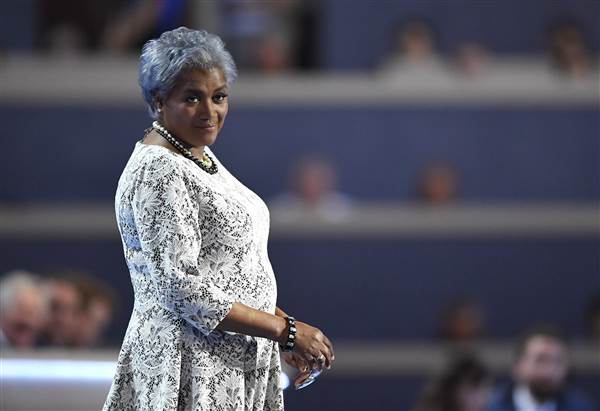

Democratic National Committee Vice Chair Donna Brazile takes the stage during the second day of the Democratic National Convention in Philadelphia, July 26. Mark J. Terrill / AP
Sanders and Clinton both signed boilerplate joint fundraising agreements with the DNC in 2015, which created a vehicle to split proceeds between the campaigns and the party.
But Clinton’s campaign also negotiated a side deal, first reported by NBC News on Friday night, that gave it influence over staffing and other decisions at the DNC during the primary, but with the stipulation that it only affect preparations for the general election and that other candidates could strike a similar deal.
The same offer was made to all candidates, Clinton allies have argued in countering Brazile, but only Clinton took advantage of it.
And an email published by the Washington Post shows the DNC’s lawyers told the Sanders campaign they could have some kind of influence over how money would be spent to prepare for the general election if they raised enough cash for the party.
However, Sanders’ joint fundraising agreement with the DNC, signed in November, 2015, which was also obtained by NBC News, does not appear to include a supplemental deal.
And two of the Sanders campaign’s former top officials say they were never specifically offered one like Clinton’s and had no knowledge of their rival campaign’s arrangement.
“We had no addendum like this, no memorandum, no agreement like this,” said Mark Longabaugh, who was the campaign’s chief liaison to the DNC. “They basically came to us and said, here’s the agreement, take it or leave it.”
“I had no idea there was side memorandum with the Clinton campaign,” he added.
Meanwhile, Jeff Weaver, the campaign’s former campaign manager, dismissed the clause in Clinton’s agreement limiting engagement exclusively to general election activity as a fig leaf.
“Throwing this catchall at the end saying that this document doesn’t say what it says is a little disingenuous,” he said. “Anybody who suggests we were being treated the same way is playing semantic games.”
Before the Clinton campaign and the DNC struck their deal in August of 2015, the DNC was struggling financially and in need of a rescue. The Clinton campaign stepped in to help, but wanted control over their how money would be spent, harboring doubts about the leadership of then-Chair Debbie Wasserman Schultz.
Longabaugh acknowledged that the Sanders campaigns — which in the summer of 2015, had not yet become an online fundraising juggernaut — had little to offer the cash-strapped DNC and had to scrounge to pay the $250,000 bill for the party’s voter file.
The campaign later began raising enough money to be in a position to contribute to the party, but its relationship with the DNC had deteriorated precipitously.
Regardless of their intentions, Brazile argued in the excerpt published in Politico, the agreement had the affect of putting the Clinton campaign in a position of influence that Sanders and other campaigns did not enjoy, though she was careful not to claim the deal affect the outcome of the primary.
Brazile wrote that she later called Sanders to tell him about the Clinton campaign’s agreement in one of the more difficult phone calls of her career.
more recommended stories
 Over 300 People Facing Federal Charges For Crimes Committed During Nationwide Demonstrations
Over 300 People Facing Federal Charges For Crimes Committed During Nationwide DemonstrationsThe Department of Justice announced that.
 Democrats’ Efforts To Destroy The Second Amendment Will Be Fought
Democrats’ Efforts To Destroy The Second Amendment Will Be FoughtWASHINGTON – U.S. Senator Lindsey Graham (R-South.
 Biden-Nominated Attorney Rachael Rollins Violated Ethics Laws
Biden-Nominated Attorney Rachael Rollins Violated Ethics LawsWASHINGTON—House Committee on Oversight and Accountability.
 US ‘Accidentally’ Sends $6.2 Billion to Ukraine
US ‘Accidentally’ Sends $6.2 Billion to UkraineJune 20 (Reuters) – The Pentagon.
 Senator Atkins Introduces Bill to Strengthen Protections for Abortion, Gender-Affirming Care Providers in California
Senator Atkins Introduces Bill to Strengthen Protections for Abortion, Gender-Affirming Care Providers in CaliforniaMarch 21, 2023 SACRAMENTO – Senate President.
 Statement on President Carter’s Health – The Carter Center
Statement on President Carter’s Health – The Carter CenterATLANTA (Feb. 18, 2023) — After.
